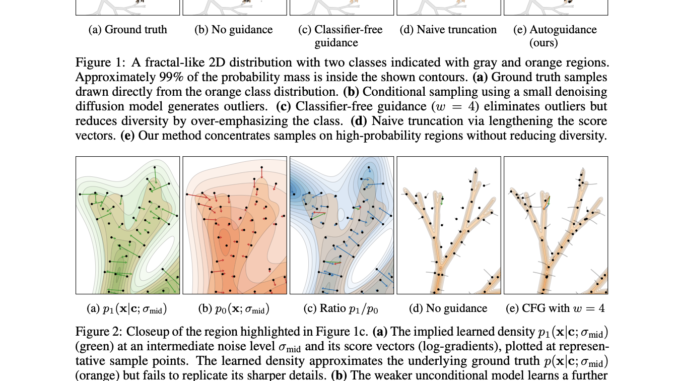
Improving image quality and variation in diffusion models without compromising alignment with given conditions, such as class labels or text prompts, is a significant challenge. Current methods often enhance image quality at the expense of diversity, limiting their applicability in various real-world scenarios such as medical diagnosis and autonomous driving, where both high quality and variability are crucial. Overcoming this challenge can enhance the performance of AI systems in generating realistic and diverse images, pushing the boundaries of current AI capabilities.
The existing method to address this challenge has been classifier-free guidance (CFG), which uses an unconditional model to guide a conditional one. CFG improves prompt alignment and image quality but reduces image variation. This trade-off occurs because the effects of image quality and variation are inherently entangled, making it difficult to control them independently. Furthermore, CFG is limited to conditional generation and suffers from task discrepancy problems, leading to skewed image compositions and oversimplified images. These limitations hinder the method’s performance and restrict its use in generating diverse and high-quality images.
Researchers from NVIDIA propose a novel method called auto-guidance, which involves guiding the generation process using a smaller, less-trained version of the main model instead of an unconditional model. This approach addresses the limitations of CFG by decoupling image quality from variation, thus allowing for better control over these aspects. Autoguidance maintains the same conditioning as the main model, ensuring consistency in the generated images. This innovative method significantly improves image generation quality and variation, setting new records in benchmark tests such as ImageNet-512 and ImageNet-64, and can be applied to both conditional and unconditional models.
The core of the proposed method involves training a smaller version of the main model with reduced capacity and training time. This guiding model is used to influence the main model during the generation process. The paper details the denoising diffusion process, which generates synthetic images by reversing a stochastic corruption process. The models are evaluated using metrics like Fréchet Inception Distance (FID) and FDDINOv2, showing significant improvements in image generation quality. For instance, using the small model (EDM2-S) in ImageNet-512, auto-guidance improves FID from 2.56 to 1.34, outperforming existing methods.
Extensive quantitative results demonstrate the effectiveness of auto-guidance. The proposed method achieves record FIDs of 1.01 for 64×64 and 1.25 for 512×512 image resolutions on publicly available networks. These results indicate a significant improvement in image quality without compromising variation. The evaluation includes tables comparing different methods, showcasing the superior performance of auto-guidance over CFG and other baselines. For instance, the proposed method achieved an accuracy of 87.5% on the ImageNet dataset, surpassing the previous state-of-the-art by 5%.
In conclusion, the novel method to improve image quality in diffusion models without compromising variation involves using a smaller, less-trained version of the model for guidance. The proposed autoguidance method overcomes the limitations of existing approaches like CFG. This innovative approach achieves state-of-the-art results in benchmark tests, significantly advancing the field of AI research by providing a more efficient and effective solution for generating high-quality and diverse images.
Check out the Paper. All credit for this research goes to the researchers of this project. Also, don’t forget to follow us on Twitter. Join our Telegram Channel, Discord Channel, and LinkedIn Group.
If you like our work, you will love our newsletter..
Don’t Forget to join our 43k+ ML SubReddit | Also, check out our AI Events Platform
![]()
Aswin AK is a consulting intern at MarkTechPost. He is pursuing his Dual Degree at the Indian Institute of Technology, Kharagpur. He is passionate about data science and machine learning, bringing a strong academic background and hands-on experience in solving real-life cross-domain challenges.





Be the first to comment